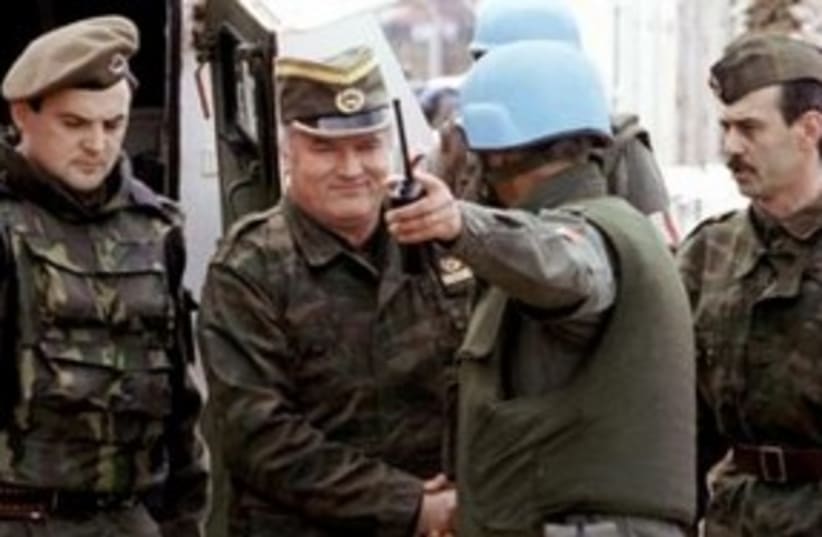BITTERSWEETBosnian Muslim survivors said the news was bittersweet."I am happy to be alive to witness his arrest and at the same time very sorry many other Srebrenica victims did not live to witness this moment," said Munira Subasic, who lost her son and husband when Bosnian Serbs under Mladic seized Srebrenica, designated at the time as a "U.N. safe area".A Mladic family friend earlier told Reuters Mladic had been taken to the headquarters of the Serbian intelligence agency after an interior ministry official said police had arrested a man going by the name of Milorad Komadic on an anonymous tip.The European Union said Mladic's arrest would show that Serbia, which was under international sanctions over the war in Bosnia and then bombed by NATO to stop atrocities in Kosovo in 1999, wanted to move forward on European Union membership."This is an important step forward for Serbia and for international justice," European Union foreign policy chief Catherine Ashton Ashton said in a statement."We expect Ratko Mladic to be transferred to the International Criminal Tribunal for the former Yugoslavia without delay. Full cooperation with the ICTY remains essential on Serbia's path towards EU membership," she added.A Serbian prosecutor said extradition procedures would take about a week.Many Serbian nationalists idolise Mladic and one representative made clear their fury with the government."This shameful arrest of a Serb general is a blow to our national interests and the state," Boris Aleksic, a spokesman for the ultranationalist Serbian Radical Party said. "This is a regime of liars -- dirty, corrupt and treacherous."Dozens of people were arrested and injured in 2008 throughout Serbia in riots following the arrest of Bosnian Serb wartime political leader Radovan Karadzic.Tadic said he would not allow a repeat of such violence."This country will remain stable," he said. "Whoever tries to destabilise it will be prosecuted and punished."Washington and other capitals hailed the arrest."The European prospects of Serbia are now brighter than ever," said Swedish Foreign Minister Carl Bildt."Serbia is a country that has suffered a lot but the fact it has delivered presumed war criminals is very good news. It's one more step towards Serbia's integration one day into the European Union," French President Nicolas Sarkozy said at a Group of Eight summit in France.Tadic said Mladic's arrest opened the way for reconciliation in the Balkans region, which is still recovering from the conflicts that tore apart old federal Yugoslavia in the 1990s."This secures Serbia's integrity in the international arena," Tadic said.Although it removes a diplomatic thorn from Serbia's side, the revelation that Mladic was in Serbia, as many suspected, raises questions as to how he eluded justice for so long.
Top war crimes suspect Mladic arrested in Serbia
Bosnian Serb general accused of orchestrating massacre of 8,000 Muslims in the town of Srebrenica and a brutal siege of Sarajevo.

BITTERSWEETBosnian Muslim survivors said the news was bittersweet."I am happy to be alive to witness his arrest and at the same time very sorry many other Srebrenica victims did not live to witness this moment," said Munira Subasic, who lost her son and husband when Bosnian Serbs under Mladic seized Srebrenica, designated at the time as a "U.N. safe area".A Mladic family friend earlier told Reuters Mladic had been taken to the headquarters of the Serbian intelligence agency after an interior ministry official said police had arrested a man going by the name of Milorad Komadic on an anonymous tip.The European Union said Mladic's arrest would show that Serbia, which was under international sanctions over the war in Bosnia and then bombed by NATO to stop atrocities in Kosovo in 1999, wanted to move forward on European Union membership."This is an important step forward for Serbia and for international justice," European Union foreign policy chief Catherine Ashton Ashton said in a statement."We expect Ratko Mladic to be transferred to the International Criminal Tribunal for the former Yugoslavia without delay. Full cooperation with the ICTY remains essential on Serbia's path towards EU membership," she added.A Serbian prosecutor said extradition procedures would take about a week.Many Serbian nationalists idolise Mladic and one representative made clear their fury with the government."This shameful arrest of a Serb general is a blow to our national interests and the state," Boris Aleksic, a spokesman for the ultranationalist Serbian Radical Party said. "This is a regime of liars -- dirty, corrupt and treacherous."Dozens of people were arrested and injured in 2008 throughout Serbia in riots following the arrest of Bosnian Serb wartime political leader Radovan Karadzic.Tadic said he would not allow a repeat of such violence."This country will remain stable," he said. "Whoever tries to destabilise it will be prosecuted and punished."Washington and other capitals hailed the arrest."The European prospects of Serbia are now brighter than ever," said Swedish Foreign Minister Carl Bildt."Serbia is a country that has suffered a lot but the fact it has delivered presumed war criminals is very good news. It's one more step towards Serbia's integration one day into the European Union," French President Nicolas Sarkozy said at a Group of Eight summit in France.Tadic said Mladic's arrest opened the way for reconciliation in the Balkans region, which is still recovering from the conflicts that tore apart old federal Yugoslavia in the 1990s."This secures Serbia's integrity in the international arena," Tadic said.Although it removes a diplomatic thorn from Serbia's side, the revelation that Mladic was in Serbia, as many suspected, raises questions as to how he eluded justice for so long.